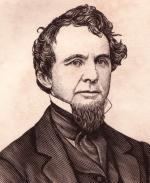James Burnside (1809-1859)
James Burnside was born in Bellefonte, Pennsylvania on February 22, 1809, the eldest son of Judge Thomas Burnside. He prepared at the Bellefonte Academy and entered Dickinson College in Carlisle, Pennsylvania with the class of 1828, graduating with highest honors. He then studied law in the office of his father and was admitted to the Bellefonte bar in 1830 and began practicing law in his father's firm.
Burnside was elected in October 1844 to the Pennsylvania state legislature and was re-elected the following year. Governor William Bigler named his fellow Centre County resident as the first judge of the newly formed Twenty-Fifth Judicial District on April 20, 1853, and, in October, 1853, his position was confirmed by election.
Burnside married Rachel Cameron, daughter of a fellow judge, on June 2, 1848. The couple had two sons and a daughter. On Friday evening, July 2, 1859, he was thrown from a runaway buggy in Bellefonte and died instantly from a fractured skull. James Burnside was fifty years old.

